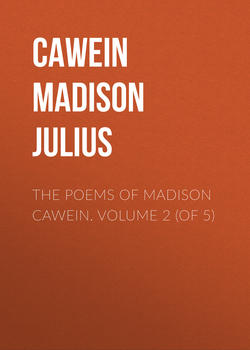Читать книгу The Poems of Madison Cawein. Volume 2 (of 5) - Cawein Madison Julius - Страница 56
RED LEAVES AND ROSES
ОглавлениеI
And he had lived such loveless years
That suffering had made him wise;
And she had known no graver tears
Than those of girlhood’s eyes.
And he, perhaps, had loved before—
One, who had wedded, or had died;—
So life to him had been but poor
In love for which he sighed.
In years and heart she was so young
Love paused and beckoned at the gate,
And bade her hear his songs, unsung;
She laughed that “love must wait.”
He understood. She only knew
Love’s hair was faded, face was gray—
Nor saw the rose his autumn blew
There in her heedless way.
II
If he had come to her when May
Danced down the wildwood,—every way
Marked with white flow’rs, as if her gown
Had torn and fallen,—it might be
She had not met him with a frown,
Nor used his love so bitterly.
Or if he had but come when June
Set stars and roses to one tune,
And breathed in honeysuckle throats
Clove-honey of her spicy mouth,
His heart had found some loving notes
In hers to cheer his life’s long drouth.
He came when Fall made mad the sky,
And on the hills leapt like a cry
Of battle; when his youth was dead;
To her, the young, the wild, the white;
Whose symbol was the rose, blood-red,
And his the red leaf pinched with blight.
He might have known, since youth was flown,
And autumn claimed him for its own;
And winter neared with snow, wild whirled,
His love to her would seem absurd;
To youth like hers; whose lip had curled
Yet heard him to his last sad word.
Then laughed and—well, his heart denied
The words he uttered then in pride;
And he remembered how the gray
Was his of autumn, ah! and hers,
The rose-hued colors of the May,
And May was all her universe.
And then he left her: and, like blood,
In her deep hair, the rose; whose bud
Was badge to her: while unto him,
His middle-age, must still remain
The red-leaf, withering at the rim,
As symbol of the all-in-vain.
III
“Such days as these,” she said, and bent
Among her marigolds, all dew,
And dripping zinnia stems, “were meant
For spring not autumn; days we knew
In childhood; these endearing those;
Much dearer since they have grown old:
Days, once imperfect with the rose,
Now perfect with the marigold.”
“Such days as these,” he said, and gazed
Long with unlifted eyes that held
Sad autumn nights, “our hopes have raised
In futures that are mist-enspelled.
And so it is the fog blows in
Days dearer for the death they paint
With hues of life and joy,—as sin,
At death, puts off all earthly taint.”
IV
Like deeds of hearts that have not kept
Their riches, as a miser, when
Sad souls have asked, with eyes that wept,
Among the toiling tribes of men,
The summer days gave Earth sweet alms
In silver of white lilies, while
Each night, with healing, outstretched palms
Stood Christ-like with its starry smile.
Will she remember him when dull
Months drag their duller hours by?
With feet that crush the beautiful
And leave the beautiful to die?
Or never see? nor sit with lost
Dreams withered, ’mid hope’s empty husks,
And wait, heart-counting-up the cost
Of love’s illusions ’mid life’s dusks?
V
He is as one who, treading salty scurf
Of lonely sea-sands, hears the roaring rocks
Of some lost isle of misty crags and lochs;
Who sees no sea, but, through a world of surf,
Gray ghosts of gulls and screaming petrel flocks:
When, from the deep’s white ruin and wild wreck,
Above the fog, beneath the ghostly gull,
The iron ribs of some storm-shattered hull
Loom, packed with pirate treasure to the deck
A century rotten: feels his wealth replete,
When long-baulked ocean claims it; and one dull
Wave flings, derisive at despondent feet,
A skull, one doubloon rattling in the skull.
VI
And when full autumn sets the dahlia stems
On fire with flowers, and the chill dew turns
The maple trees, above geranium urns,
To Emir tents, and strings with flawless gems
The moon-flower and the wahoo-bush that burns;
Calmly she sees the year grow sad and strange,
And stands with one among the wilted walks
Of the old garden of the gray, old grange,
And feels no sorrow for the frost-maimed stalks
Since—though the wailing autumn to her talks—
Youth marks swift spring on life’s far mountain-range.
Or she will lean to her old harpsichord;
A youthful face beside her; and the glow
Of hickory on the hearth will balk the blow
Of blustering rain that beats the casement hard;
And sing of summer and so thwart the snow.
“Haply, some day, she yet may sit alone,”
He thinks, “within the shadow-saddened house,
When round the gables stormy echoes moan,
And in the closet gnaws the lonesome mouse;
And Memory come stealing down the stair
From dusty attics where is piled the Past—
Like so much rubbish that we hate to keep—
And turn the knob; and, framed in frosty hair,
A grave, forgotten face look in at last,
And she will know, and bow her head and weep.”
